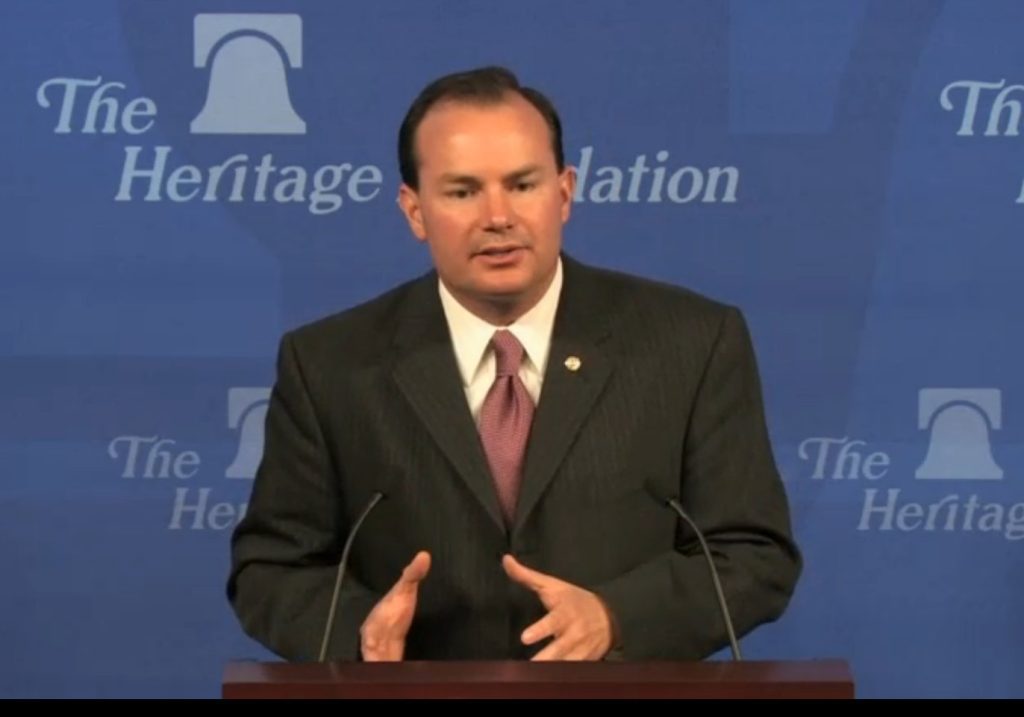In an address to the Heritage Foundation entitled “What’s Next for Conservatives”, Senator Mike Lee said, “The conservative vision for America is not an Ayn Rand novel. It’s a Norman Rockwell painting, or a Frank Capra movie: a nation ‘of plain, ordinary kindness, and a little looking out for the other fellow, too.’” The comment, which received little attention when it was made back in October, harkens back to a traditional conservatism that stressed the importance of local institutions and relationships as a source of strength. As innocuous as that might seem to most conservatives, the mildly unfavorable comparison of Ayn Rand to anyone seems to be enough to send some of her devotees into a tizzy.
Enter Yaron Brook and Steve Simpson of the Ayn Rand Institute.
Taking to the pages of The Daily Caller to defend Rand from the Utah Senator’s statement, the two conclude that Mike Lee’s vision of America is no different than Barack Obama’s. As evidence, they point to a speech Lee gave in November at a Heritage Foundation anti-poverty forum. The Senator said:
First, let’s be clear about one thing. The United States did not formally launch our War on Poverty in 1964, but in 1776: when we declared our independence, and the self-evident and equal rights of all men to life, liberty, and the pursuit of happiness.
Brook and Simpson responded to Lee’s assertion by sarcastically asking, “American colonists fought the most powerful nation on earth as a precursor to a mid-20th century welfare program?”
It would be obvious to all but the most obtuse readers that it was not Lee’s intention to compare the American Revolution to LBJ’s War on Poverty. To anyone who cared to read beyond the cherry picked excerpt Brook and Simpson provided, Lee explicitly says what he means a few sentences later:
From our very Founding, we not only fought a war on poverty – we were winning. The tools Americans relied on to overcome poverty were what became the twin pillars of American exceptionalism: our free enterprise economy and voluntary civil society.
Are the luminaries at the Ayn Rand Institute denying that free enterprise and voluntary association have been the most effective tools in reducing poverty? I suppose that makes them no better than Obama.
It’s sad to see such knee jerk hostility to the idea that communal ties, beyond those that are the result of cold economic calculation, played an integral part of the success America enjoys. It’s also not very conservative.
While the Randians rightfully hold individual achievement as the primary building block of prosperity, they seem to think that it occurs in a vacuum defined by the size and scope of government. They’d have you believe that all the remarkable individuals of the world need in order to reach their potential is the absence of government.
But the truth is more complex than they’d lead you to believe. There are more conditions that contribute to the level of individual achievement in America than we can even begin to catalogue here. The social stability that provides the safe space in which the individual flourishes is not the result of abstract principles divined from a Rand novel. It is the result of millions of relationships, shared beliefs, and communal bonds or, as Edmund Burke famously put it, being “attached to the subdivision, to love the little platoon we belong to in society”.
Norman Rockwell’s ability to capture the spirit of Burke’s little platoons is what makes his work a more appropriate metaphor for what makes America great than anything Rand wrote. The idealized image of a family sitting around a Thanksgiving table says more about America in one image than Atlas Shrugged was able to say in 1,168 pages of dense text.
Yaron Brook and Steve Simpson would have you believe that attributing America’s success to strong communal bonds is a deviation from conservatism or the vision of the founders. To the contrary, denying them is the true deviation.
Nick Rizzuto is the Supervising Producer of Real News on TheBlazeTV.



